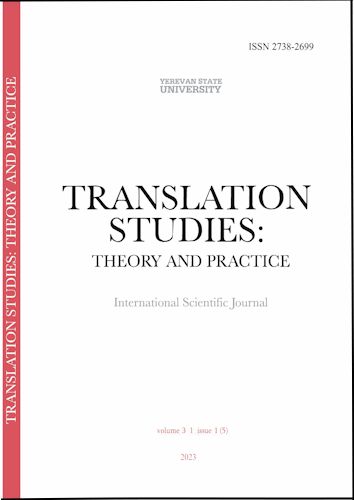Errors and Difficulties in Translating Maritime Terminology
DOI:
https://doi.org/10.46991/TSTP/2023.3.1.066Keywords:
maritime terms, maritime language, maritime texts, translationeseAbstract
This paper is part of an extensive research project on maritime language translation, which I consider to be a crucial but neglected area in translation studies, despite the maritime industry's significant relevance in today's world. It is essential to note that the maritime industry is vital to global trade and economic growth, providing employment opportunities worldwide and playing an increasingly important role in marine environmental protection. Although maritime activity generates a considerable amount of translation work, there is still a shortage of empirical research on the challenges of translating maritime genres, particularly with regards to terminology. This paper aims to address this gap by identifying the main difficulties encountered in translating maritime terminology and common errors that translators tend to make. It also draws useful comparisons between specialized texts written in English and their Romanian counterparts (and vice versa), highlighting the contrasts between the two languages and the impact of maritime terminology.
References
Blakey, T. N., 1987. English for Maritime Studies. Prentice Hall International (UK) Ltd.
Casanova, P., 2010. “Consecration and Accumulation of Literary Capital: Translation as Unequal Exchange”. In Baker, Mona (ed.), Critical Readings in Translation Studies. London & New York: Routledge, pp. 283-303.
Coşeriu, Eugenio, 1975. Die Geschichte der Sprachphilosophie von der Antike bis zur Gegenwart. Bd.1. Tübingen: Günter Naar. 2te Ausgabe.
Croitoru, E. 1996. Interpretation and Translation. Galaţi: Porto Franco.
Cronin, Michael. 2003. Translation and Globalization, London & New York: Routledge.
Cronin, Michael. 2010. “The Cracked Looking Glass of Servants: Translations and Minority Languages in a Global Age” in Baker Mona (ed.), Critical Readings in Translation Studies, London & New York: Routledge, pp. 247-262.
Dejica, Daniel. 2008. “Information Universe and Text Perspectives in Translation: The Hol-Atomistic Phase”. In Croitoru, E. (ed.) Translation Studies, Retrospective and Prospective Views, 3/2008. Galaţi: Galaţi University Press Foundation, pp. 77-91.
Dejica, Danilel. 2010. Thematic Management and Information Distribution in Translation. Timisoara: Editura Politehnica.
Davidson, B. 2010. “The Interpreter as Institutional Gatekeeper: The Social-Linguistic Role of Interpreters in Spanish-English Medical Discourse”, in Baker, Mona (ed.), Critical Readings in Translation Studies, London & New York: Routledge, pp 152-173.
Felber, H. 1984. Terminology Manual. Paris: General Information Programme & UNISIST, UNESCO, Infoterm.
Gerzymisch-Arbogast, Heidrum. 2008. “Fundamentals of LSP Translation”. In Heidrum Gerzymisch –Arbogast, Gerhard Budin, Gertrud Hofer (eds.), LSP Translation Scenarios. Selected Contributions to the EU Marie Curie Conference, Vienna 2007, MuTra Journal (02), Germany: ATRC Group, pp, 7-64.
Gotti, Maurizio. 2006. Studies in Specialized Discourse, Bern/ Berlin/ Bruxelles/ Frankfurt am Main/ New York/ Oxford/ Wien: Peter Lang.
Gotti, Maurizio. 2008. Investigating Specialized Discourse. Bern: Peter Lang AG, European Academic Publishers.
Hönig, H. G. 1997. “Positions, Power and Practice: Functionalist Approaches and Translation Quality Assessment”, in Current issues in Language and Society, Vol. 4, pp. 6-34.
Newmark, Peter. 1988. Approaches to Translation. Hertfordshire: Prentice Hall.
Newmark, Peter. 1991. “Word and Text: Words and their Degree of Context in Translation”. In P.P. Newmark (ed.). About Translation. Clevedon: Multilingual Matters, pp. 87-100.
Pritchard, Boris, 2006. “Some Lexical Aspects of Translating Specialized Texts”. In Maurizio Gotti, & Susan Šarčević, (eds.), Insights into Specialized Translation, Bern: Peter Lang, pp 155-172.
Reguzzoni, M. 2006. ‘A Lexical Investigation into a Pedagogic Corpus of English for Maritime Studies’ Newsletter/ Journal of Professional and Academic English. 28:9-23.
Sandrini, Peter. 2008. “Localization and translation”, in Gerzymisch-Arbogast, H., Budin, G., Hofer, G. (eds.), LSP translation scenarios. Selected contributions to the EU Marie Curie Conference Vienna 2007, Journal 02, Vienna: ATRC Group.
Snell-Hornby, Mary. 1992. “The professional Translator of Tomorrow: language Specialist or All-round Expert?” In Dollerup, Cay; Loddegaard, Anne (eds.). Tecahing Translation and Interpreting. Amsterdam: Benjamins, pp. 9-22.
Van der Meer, E. 2002. Temporal order relations in language comprehension, in Journal of Experimental Psychology: Learning, Memory and Cognition. pp. 167-192.
Vişan, Ioana-Raluca (a). 2021. Translating Maritime Language (Volume 1):Maritime Language: A Branch of Language for Specific Purposes (LSP). Timişoara: Editura Politehnica.
Vişan, Ioana-Raluca (b). 2021. Translating Maritime Language (Volume 2): Aspects of Maritime Language in Trannslation. Timişoara: Editura Politehnica.
Vȋlceanu, Titela. 2008. Translation: The Land of the Bilingual. Craiova: Editura Universităţii Craiova.
Schäffner, C. 2004. “Developing Competence in LSP Translation”. In Fleischmann, E., Schmitt, P. Wotjak, G. (Eds.) Translationkompetenz. Tübingen: Stauffenburg, pp. 679-89.
Downloads
Published
Issue
Section
License
Copyright (c) 2023 Ioana-Raluca Visan

This work is licensed under a Creative Commons Attribution-NonCommercial 4.0 International License.





